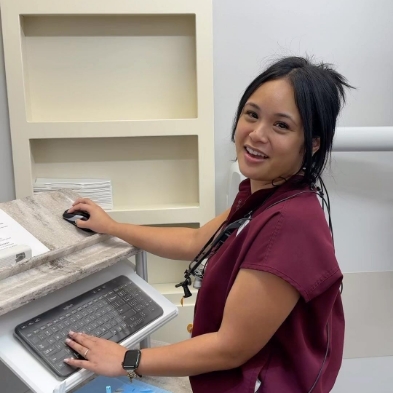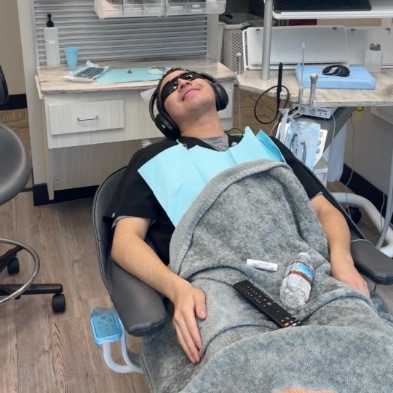Pink gum tissue
Gums and bone firmly hug and anchor the tooth
No bleeding noted during brushing, flossing, or evaluation
Unlike the phase in your childhood when your baby teeth fall out, losing teeth in your adult years is not normal. With proper hygiene practices and the modern technology of the dental field, adult teeth can and should last an entire lifetime!
When it comes to dental health, the tooth itself is not the only part to consider. The gums and the rest of the mouth matter as well. Ensuring that your mouth is entirely taken care of is essential to help avoid problems down the road. There are, however, many different circumstances and habits that can lead to problems, and if an infection in the gums does occur, gum disease treatment in Arlington Heights may be an option to help improve the afflicted area.
I Need a Checkup & Cleaning I am Looking for a Dentist for My Child I Have a Cavity or Broken Tooth I am Missing One or More Teeth I am Unhappy with My Smile I am Scared of the Dentist I am in Pain & Need Help I Need My Wisdom Teeth Removed I am Concerned about Sleep Apnea I Would Like to Reduce the Appearance of Fine Lines & Wrinkles View Our Services
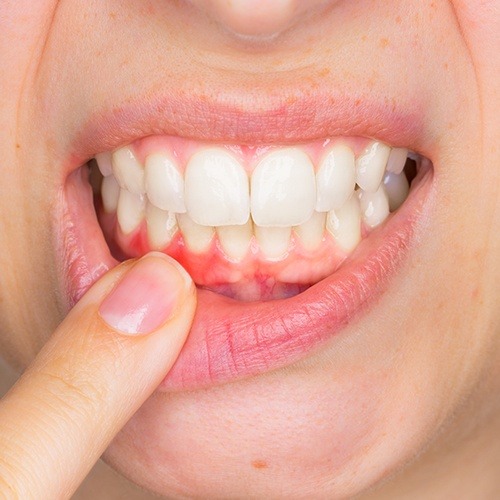
A problem that affects about half of the American population, gum disease is an infection and inflammation of the gums that is typically caused by poor dental hygiene. When plaque and bacteria build up along the gumline, infection can occur, leading to numerous symptoms and serious issues if left untreated. However, in its earlier stages, gum disease can be completely reversed before the infection spreads.
There are different stages of gum disease and the type of treatment that you need will vary based on the severity of the infection. These include:
Pink gum tissue
Gums and bone firmly hug and anchor the tooth
No bleeding noted during brushing, flossing, or evaluation
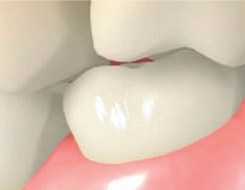
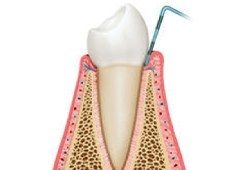
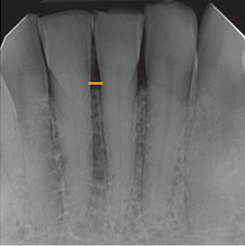
Red and inflamed gum tissue
Gums may feel tender and swollen
Possible bad breath
Bleeding gums during brushing, flossing, and/or evaluation
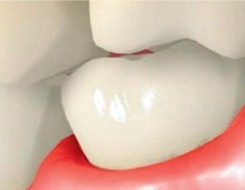
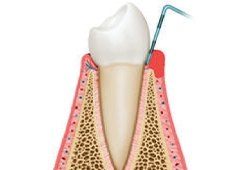
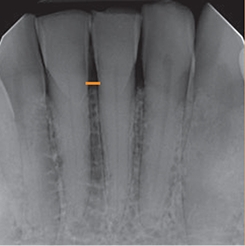
Gums separate from the teeth, creating spaces or pockets
Bad breath
Gums recede making teeth appear longer
Exposed root surfaces may be sensitive and at risk for decay
Bone loss evident on radiographs
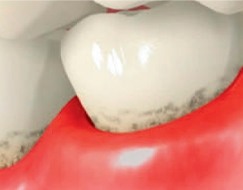
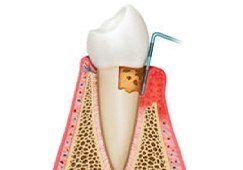
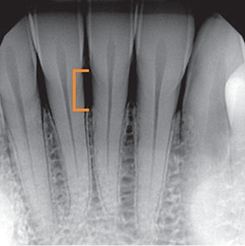
Foul odor and bad taste are constant
Teeth become mobile, and shift, changing the bite
Severe horizontal and vertical bone loss evident
Most often resulting in tooth loss
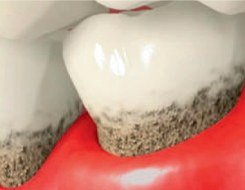
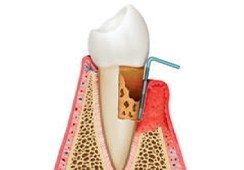
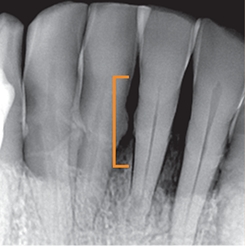

Your gums may not get the same spotlight that your teeth do, but that doesn’t mean they’re any less important. In fact, without healthy gums, your teeth couldn’t be properly supported. However, there are even bigger issues to worry about with gum disease than the health of your smile. Gum disease causes higher risks of cardiovascular disease, strokes, uncontrolled diabetes, colorectal cancer, respiratory infections, and even Alzheimer’s. As studies continue to show this relationship between gum health and overall health, it’s more vital than ever to practice a good oral healthcare routine.
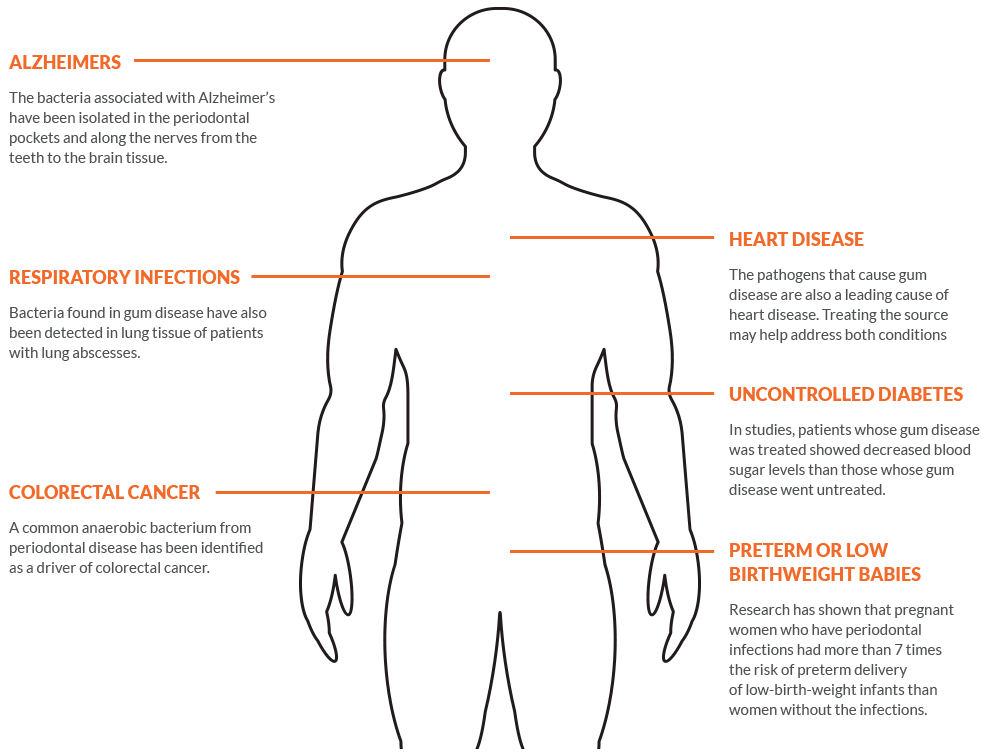

If gums are diseased and inflamed, it can cause an array of problems that could end up affecting your teeth. Periodontal therapy is the recommended method to help restore the area of the diseased gums. Also known as gum disease treatment, it can take many forms for each specific case and type of issue. The primary goal of each treatment is to restore the damaged area.
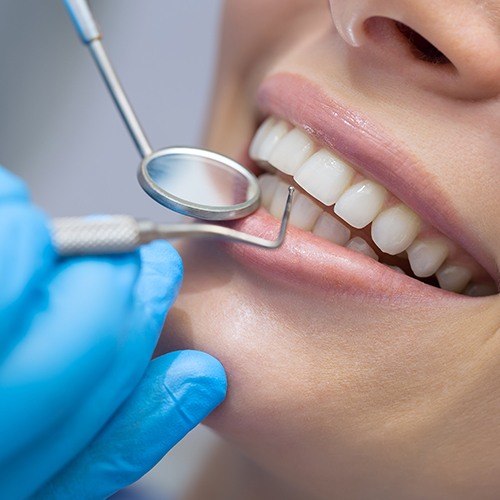
Scaling and root planing is a two-step process that we use to tackle gum disease and prevent permanent oral damage. First, we’ll clear all plaque and tartar from above and below the gumline to control harmful oral bacteria accumulation. This will help restore the health of your oral tissues and common symptoms like inflammation and tenderness. Then, we’ll smooth out the roots of your teeth so your gums can healthily reattach.
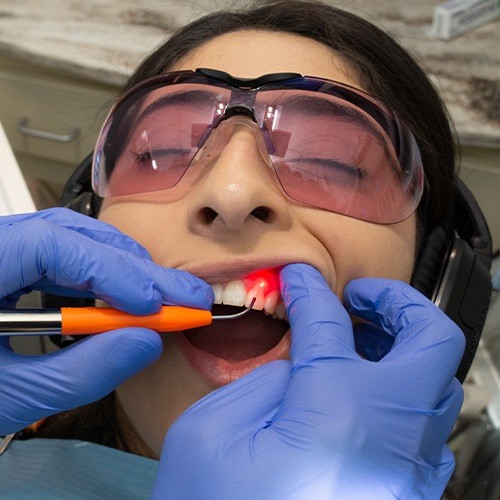
Our soft tissue laser utilizes a beam of light to accurately remove any severely damaged and infected gum tissue to provide your gums with a chance to heal. It cauterizes the area and at the same time removes the tissue as well, eliminating the need for sutures, scalpels, bleeding, and a long recovery time. Plus, due to the precise nature of our soft tissue laser, this treatment is fast and comfortable.

The longer gum issues go untreated, the worse the problem gets, and more intense therapy methods may be required. For mild cases, something as small as a deep gum cleaning may be sufficient, but in severe cases where the gum has infected the bone, and tooth loss is imminent or already occurring, surgical methods such as grafting new gums to protect the nerves may be necessary.

Despite your best efforts, avoiding gum disease during your lifetime may be impossible. It’s quite a common problem, affecting nearly half of adults. Something as simple as not brushing or flossing as regularly as you should along with missing regular dental checkups and teeth cleanings can lead to negative consequences. However, if you suspect gum disease is already occurring, the best step is to schedule an appointment with a professional as soon as possible.

Located in Arlington Heights, Westgate Dental Care cares about our customers and community. We strive to ensure a calm environment to help relax guests as soon as they enter. Dental appointments can sometimes leave people apprehensive, but our team comes prepared with different amenities to help even the most anxious guests ease into their visit. When dealing with gum disease, depending on how developed the case has become, some methods of treatment can be more intensive. Our dental professionals will analyze and thoroughly examine your problem, and then come up with the best tactics to help you most effectively and efficiently.
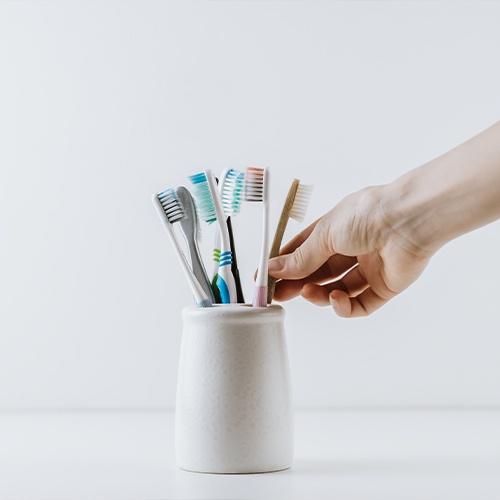
Thankfully, gum disease can be prevented by taking the proper steps on your own time. Be sure to brush your teeth twice a day, for two minutes each session. Angle your brush at 45 degrees on your gumline to clean away as much plaque and bacteria as possible. You should also floss your teeth once a day to remove any lingering food debris from between your teeth. Lastly, for an extra level of cleaning, use a nonalcoholic mouthwash to reach places your brush and floss cannot.
Westgate Dental Care focuses on patient comfort, offering noise-canceling headphones, warm blankets, and even sunglasses to reduce the harshness of bright lights in the exam room. All of our patients who undergo periodontal therapy leave feeling much healthier and happier. Dealing with gum disease doesn’t have to be an embarrassing or terrible experience, so visit your dentist in Arlington Heights today to learn more.

When battling gum disease, you may notice that you develop bad breath. Unlike the kind that forms after eating certain foods, like garlic or onions, no amount of brushing can eliminate the bacteria that cause halitosis (chronic bad breath). With the help of our Westgate Dental Care team, though, we can implement effective strategies to remove the foul odor and help you enjoy fresher breath moving forward.
Learn More About Treating Bad Breath
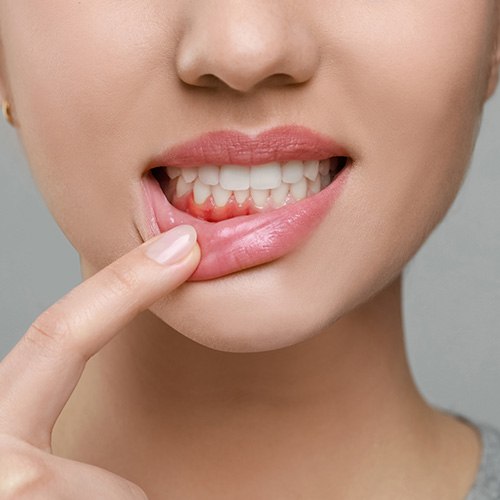
Gum disease is a serious oral health issue that could lead to long-term consequences for your smile! Here at Westgate Dental Care, we are committed to helping patients prevent and/or fight back against this potentially devastating condition. We are also enthusiastic about patient education, so you can feel free to ask us anything that is on your mind about gum disease or the treatments for it. In the meantime, you might gain some valuable insight by reviewing the FAQs listed below.
The sad truth is that everyone is at risk for gum disease! However, some groups are much more likely to develop it than others, including:
At first, gum disease can be very subtle. In its earliest stage, known as gingivitis, it might just cause your gums to look a little red and swollen. They might also bleed easily when you brush and floss. Persistent bad breath is also common.
As gum disease progresses into periodontitis, you might notice that your gums are receding or that your teeth start to feel loose. Increased dental sensitivity may also occur as gum recession exposes your tooth roots.
Yes, children can get gum disease. Kids who have a difficult time adapting to an oral hygiene routine, or who have disorders that affect their ability to care for their smile, are at a particularly high level of risk.
Fortunately, most cases of gum disease in kids are gingivitis, which can often be reversed via thorough oral hygiene and the support of a qualified dental team.
The bacteria that cause gum disease are trapped beneath the gumline, so they are unlikely to spread to other people through casual contact. However, to be on the safe side, you might choose to avoid sharing silverware and toothbrushes with other people while you are undergoing treatment (not sharing such items is a good practice even for people without gum disease). Also, keep in mind that kissing can allow the bacteria that cause gum disease to spread from person to person.
Basically, you should avoid any activities that involve the exchange of oral fluids.
